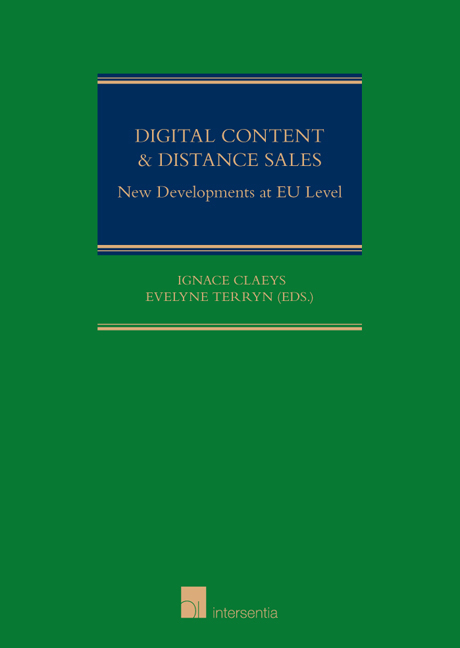Book contents
- Frontmatter
- Preface
- Contents
- List of Authors
- Part I Introduction
- Part II Proposals for a Directive on Online and Distance Sales of Tangible Goods and for a Directive on Digital Content
- Proposal for a Directive on Certain Aspects Concerning Contracts for the Online and Other Distance Sales of Goods: Scope of Application, Definitions and Conformity
- Proposal for a Directive on Digital Content: Scope of Application and Liability for a Lack of Conformity
- Remedies, Modification of Digital Content and Right to Terminate Long-Term Digital Content Contracts
- Commercial Guarantees in the Proposal for a Directive on Certain Aspects Concerning Contracts for the Online and Other Distance Sales of Goods
- Right of Redress
- Part III Proposal for a Regulation on Cross-Border Portability of Online Content Services in the Internal Market
- PART IV CONCLUSION
Remedies, Modification of Digital Content and Right to Terminate Long-Term Digital Content Contracts
from Part II - Proposals for a Directive on Online and Distance Sales of Tangible Goods and for a Directive on Digital Content
Published online by Cambridge University Press: 21 September 2018
- Frontmatter
- Preface
- Contents
- List of Authors
- Part I Introduction
- Part II Proposals for a Directive on Online and Distance Sales of Tangible Goods and for a Directive on Digital Content
- Proposal for a Directive on Certain Aspects Concerning Contracts for the Online and Other Distance Sales of Goods: Scope of Application, Definitions and Conformity
- Proposal for a Directive on Digital Content: Scope of Application and Liability for a Lack of Conformity
- Remedies, Modification of Digital Content and Right to Terminate Long-Term Digital Content Contracts
- Commercial Guarantees in the Proposal for a Directive on Certain Aspects Concerning Contracts for the Online and Other Distance Sales of Goods
- Right of Redress
- Part III Proposal for a Regulation on Cross-Border Portability of Online Content Services in the Internal Market
- PART IV CONCLUSION
Summary
INTRODUCTION
In an ideal world, contracting parties should know their contractual rights and obligations with sufficient certainty and without prohibitive cost. We all know that the reality is oft en different. Parties either incur additional costs to determine their legal position, or they accept the risk of not knowing the ins and outs of their legal position (and sometimes they can still invoke mistake or some other remedy for not having been sufficiently informed when concluding the contract). This is true for domestic transactions and even more so for crossborder contracts. Th ose active on the market in the European Union (EU), both businesses and consumers, are confronted not with a single contract law regime but with at least as many contract law regimes as there are Member States. Evidently, many concepts, principles and rules of contract law are quite similar across the borders of the EU Member States, and the EU institutions have created uniform contract law rules in an incremental way through various sets of legal instruments, such as regulations and directives, and also through the case law of the Court of Justice. Th ose rules are, however, mostly limited in scope and are mainly restricted to business-to-consumer (B2C) transactions. Persons active on the EU market (and, a fortiori, those active internationally) are therefore forced to include the effects of the variety of national contract law regimes in their legal risk assessments. While large companies spend money on comparative exercises, for example by preparing long questionnaires on issues of national contract law regimes, most small and medium-sized enterprises (SMEs) and consumers do not have the financial means to perform such exercises and therefore either take the legal risk involved or refrain from engaging in a particular activity.
Starting in the 1980s, these transaction costs led to the establishing of various sets of definitions, rules and principles in European contract law (and beyond). Contract law specialists like to denominate those sets by their abbreviations, the main ones being the PECL, the DCFR, and the CESL. While the former two sets were mainly academic exercises, the Common European Sales Law (CESL) was a directive proposed in 2011 by the previous European Commission.
- Type
- Chapter
- Information
- Digital Content and Distance SalesNew Developments at EU Level, pp. 167 - 232Publisher: IntersentiaPrint publication year: 2017



